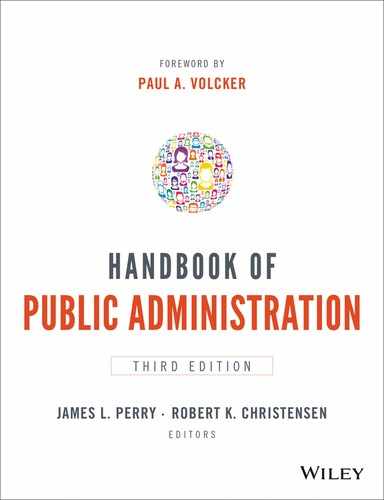Part 6
Sharpening the Public Administrator's Skill Set
Part 6 acknowledges the centrality of individual competence for administrative effectiveness. Effective systems and skilled administrators are critical success factors for public organizations and systems. Public administration practitioners who develop leadership, intrapersonal, collaboration, negotiation, and communication skills enhance the capacity of their organizations to achieve their goals. The chapter authors in this part provide valuable insights into these important skills.
As we and the contributors have emphasized throughout the book, little of what happens in the public sector is self-implementing or self-administering, especially in this era of rapid change and evolutionary transformation. The gradual shift from traditional to emergent institutions creates uncertainty and unpredictability. The role of any hidden hand in the production of public goods or services is often minimized because work in the public sector has its roots in market failures or government's police power. Thus, when a public organization achieves its mission, when a public program reaches its goals, or when citizens express satisfaction with public services, results can often be traced to specific success factors. Among the most crucial success factors are the skills of public administrators—those abilities to translate knowledge into effective practice.
The array of skills that differentiate effective from ineffective public administrators can be daunting. For perspective, the concluding chapter of this book provides a parsimonious list of these skills, attributes, and dispositions. The skills in part 6 are given special attention for two reasons. First, they are generally acknowledged by reflective observers of public administration as the most consequential administrative skills. Students and practitioners of public administration can turn few pages in public administration texts or public management magazines without direct encounters with the skills highlighted here.
Readers will be impressed by both the complexity of the five administrative skills discussed in the chapters in part 6 and the convergence among them. In situations requiring collective leadership, a concept that Sonia Ospina and Erica Foldy carefully develop in chapter 27, leaders must sense the need for collective leadership and have the ability to manage the cognitions of audiences. These forms of personal awareness and sense making are among the intrapersonal skills Maria Aristigueta and Robert Denhardt illuminate in chapter 31. The collaboration skills that Rosemary O'Leary identifies in chapter 29 play consequential roles in many contexts, among them collective leadership situations. Collaboration skills also figure prominently in negotiations where parties are seeking win-win results, reflecting the convergence of collaboration and negotiation skills, which are the focus of chapter 28 by Lisa Amsler. Of course, negotiation and communication skills, discussed in chapter 30 by James Garnett, infuse many administrative processes and situations, including leadership, collaboration, and interpersonal relationships.
A second reason for giving special attention to the administrative skills in this part is that we know a great deal about them—including the personal behaviors that exemplify the best practice of these skills and how they influence the dynamics of different administrative situations. In a nutshell, many of these skills can be acquired through combinations of study, practice, and reflection. The capacity for mastery of these skills is simultaneously a rationale for their inclusion and a goal for aspiring public administrators.
Thus, the intersection of two factors—consequence and potential for mastery—elevate leadership, intrapersonal, collaboration, negotiation, and communication skills to the forefront in this part. Just as identifying and articulating major goals and monitoring performance against the goals is important strategically, public organizations acting strategically acquire, train and nurture staff for excellent leadership, intrapersonal, collaboration, negotiation, and communication skills.
